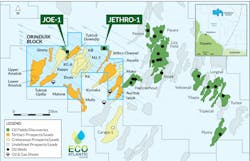Offshore Guyana partners assess implications of heavy oil analysis
Offshore staff
LONDON and TORONTO – Analysis of oil samples taken from the recent Jethro and Joe discovery wells offshore Guyana suggests that both fields contain heavy crudes with a high sulfur content.
Operator Tullow Oil and its partners are assessing the commercial viability, taking into account the quality of the oil and the reservoir sands and strong overpressure.
The wells on the Orinduik license proved two different oil plays in the Cretaceous and Tertiary intervals. Tullow said it retained confidence in the potential of multiple prospects identified in these plays throughout the license and in the non-operated offshore Kanuku blocks.
Both structures were drilled on the far north of the company’s acreage. Tullow continues to update its petroleum system models in pursuit of further prospects and lighter oil in the area.
These, and the result from the Repsol-operated Carapa well on Kanuku, will help shape the planned 2020 drilling campaign.
Orinduik partner Eco (Atlantic) Oil & Gas said the samples from Jethro-1 and Joe-1 indicate mobile heavy crudes, similar to the commercial heavy crudes found in the North Sea, Gulf of Mexico, the Campos basin offshore Brazil, Venezuela, and Angola.
The partners have brought in a heavy oil development consultant to answer their technical queries and to assess various potential development drilling and production scenarios.
Jethro-1’s 8,500-psi (586-bar) reservoir (2,600-psi/179-bar overpressure) has the advantage of natural drive efficiency, Eco said. The high reservoir temperature of 94°C (201°F) and an estimated flowing well head temperature of 90°C (194°F) are both positive in terms of oil mobility and should provide an advantage at the floating production facility, the company added.
Colin Kinley, Eco’s COO, said: “The fact that the oil is already hot in the reservoir, and mobile, and has high quality porous sand to travel through, helps to eliminate a great part of the conventional heavy oil challenge.
“Having 8,500 psi in the porous warm formation is an added advantage to drive the oil to the well. Horizontal well technology can allow excellent access to these thick fields and generally reduces the need for multiple additional wells, leading to lower development cost per barrel.”
11/13/2019
